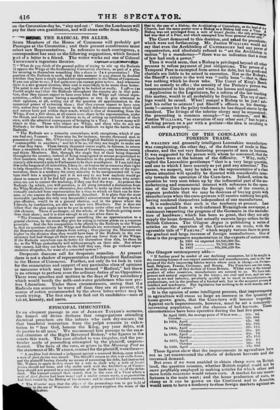EPISCOPAL IMMUNITIES.
Is an eloquent passage in one of JEREMY TAYLOR'S sermons, the honest old divine declares that congregations attending doctrinal preachers are like infants who suck dry-nurses ; for that beneficial instruction from the pulpit consists in exhcr- tation to " fear God, honour the King, pay your debts, ar.d do justice to all men." We recommend this passage to the est e- cial attention of the Right Reverend Bishop,* who figures in the courts this week. The case alluded to was singular, and the par- ticular mode of proceeding attempted by the plaintiff, unprece- dented. The facts of the case, as given in the Morning Post us the statement of Mr. WATSON, counsel for the plaintiff, were these- " A creditor had obtained a judgment against a reverend Bishop, upon which a writ of fieri /arias was issued. The Sheriff's return to this was untie bona ; and the plaintiff having thereby no means of recovering his debt, hail instructed Air. Watson to apply to this court for a rule to show why a writ of lecari filcias should not Issue, and why under such writ the Archbishop of Camel- bury should not proceed to a sequestration of the lands and g. As of the defen- dant. The learned counsel then stated, that in the ease of a Vicar where a writ of yieri forias had been issue,' and a smilar return made, a sequestration had heen issued by the Bishop of his diocese ; and he should therefore contend, The Courier says that the object of the proceedings was to get held of in the see of Worcester: the ether papers suppress the name of the Laker. smana
Church,
that in the case of a Bishop, the Archbishop of Canterbury, as the beadIt of e bad the same power over a Bishop as a Bishop had over a Vicar. ti Bishop was not privileged from a writ of letiati facia, ; the only privile.A had was that of a Peer, and which exempted him from personal arrest onqs The Court demurred to this doctrine, and asked for precedents; which were not forthcoming. Mr. Justice WILLIAMS would not say that even the Archbishop of CANTERBURY had any power of sequestration, and absolutely refused to " set the Archbishop in motion " by a mandamus--" there was no indication that a court of law had such a power." Thus it would seem, that a Bishop is privileged beyond all other persons to refuse payment of just obligations. The person of a Temporal Peer is exempted from arrest for debt, but his goods and chattels are liable to be seized in execution. Not so the Bishop's; the Sheriff's return to the writ was " nulla bona "—that is, there was nothing which he durst take. The Court of King's Bench had no remedy to offer ; the sanctity of the Prelate's person was communicated to his plate and wine, his horses and apparel. Application to the Legislature, for a reform of the law touching this matter, would in all probability be fruitless. The cry of saen. lege would be raised. What ! compel a Bishop to be just! sub, ject his cellar to seizure ! put Sheriff's officers in his drawing. room I—sooner let the paltry tradesmen he has duped starve by the hundred. The livings of the inferior clergy may be sequestered; the proceeding is common enough—" as common, said Mr. Justice WILLIAMS, "as execution of any other sort ;" but to put a working parson on a par with a prelate—the idea is revolting to all notions of propriety.


























 Previous page
Previous page